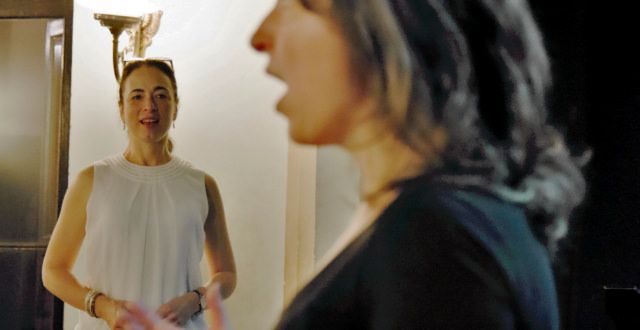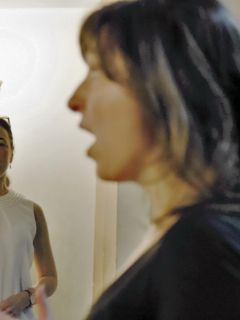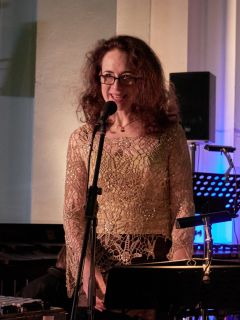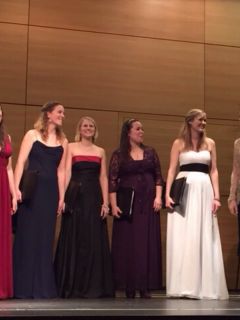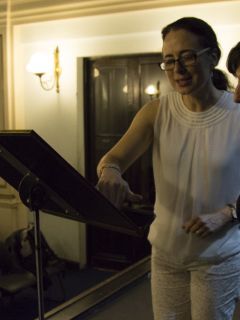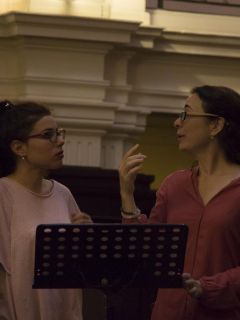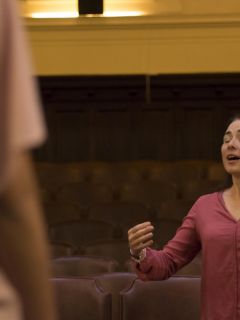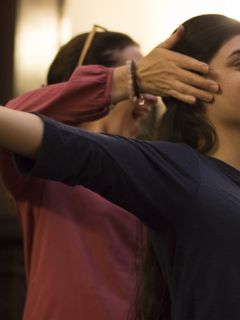Teaching
Teaching Experience
When I received the invitation to start teaching voice students at the Hochschule für Musik in Nürnberg in 2003, I relished the opportunity to share my artistic, musical, and professional experience with new students. Until then, I had taught occasional private students and given several masterclasses at my Alma Mater, Goshen College. Now, fifteen years later, teaching has become a major part of my professional work. Working with young singers is full of discovery and variety, and I enjoy following their musical and personal development throughout their studies and beyond.
My many years of experience in all areas of classical music flow into my teaching: opera and church literature, recitals and chamber music, professional choral experience, many languages, an expansive repertoire—from early to contemporary, studio and live recordings, as well as my earlier piano training.
A personal highlight for me was an exciting project of contemporary vocal music that I put together and performed with students in May 2017. It went by the title of „Jenseits der Arie“ (Beyond the Aria) and involved 25 vocal and instrumental students from Nürnberg’s Musikhochschule. The huge musical, physical, and organizational challenges were rewarded by the complete satisfaction of the participants and the raves of the audience.
Another teaching highlight for me was giving a masterclass for singers in Córdoba, Argentina in August 2017, as part of a new singing festival, „Tones 2017.“ The fifteen participants were talented and well-prepared, but it was thrilling to be a catalyst for many new discoveries and big improvements through a week of very intense work.
When I sing, I communicate
with body, mind, and soul
When teaching, I especially focus on using the voice in a free and flexible way, integrating body, emotions, and expression from the start. Singers’ use of language and study of the vocal literature in various styles engages the intellect from the start, but the voice itself is essentially a form of purely emotional expression. We are always seeking a balance between the head and heart, and we need enough technical understanding that both the text and the pure vocal sound can flow through us unhindered.
To be able to open their voices and personalities, it is essential to create an atmosphere of trust in which the students can comprehend and access the abilities, powers, and imagination that they already have within them. Technically, the vocal organ is a sum of many parts that are also engaged in many other activites (speaking, tasting, smelling, sneezing, swallowing, breathing, panting, yawning, laughing, etc.), and it is only through coordinating the many muscles, large and small, through dynamic movement, that singing can take place.
My many years on the opera stage taught me so much about body expression as a part of vocal communication. We spend so much time on stage during which we are not actually singing, but rather listening. We are nearly always in dialogue with singing colleagues and with the orchestra, and it is important to show our inner thoughts and emotions beyond the ones we are actually saying and singing in any particular moment.
So from the very beginning I want to connect the technical work to the expression. Every tiny exercise can be sung with passion, joy, or humor, and we want our singing to have the ease and normality of speaking or laughing. Through dynamic internal and external movement our bodies always support the music.
Teachers and Mentors
I am extremely grateful for the people who have accompanied my vocal development from my college years and throughout my singing career. Kay Montgomery not only gave me a solid technical and musical foundation, but also showed me through her own example how important aura, expression, and posture are for a singer—on and off stage. She gave me the confidence to even imagine becoming a professional singer.
At the same time, I studied piano with Marvin Blickenstaff, one of the greatest teachers that I know. His pedagogical work and his own discipline as a performer encouraged and inspired me and so many others, and besides constantly using piano when I teach, I also carry many of his pedagogical insights into my teaching .
In Munich I continued my study with Julia Faulkner, who brought me forward by leaps and bounds. She was singing at the Bayersiche Staatsoper at the time--and later the Viennese State Opera, and gave me many opportunities to experience the „grand world of opera.“ Through her I also met John Norris, whose amazing body work with singers is as hard to describe as it is stunning in its emotional depth. During these years I also worked with the vocal coach Donald Wages (also from the Bavarian State Opera), who solidly prepared me with so many musical and vocal tools for my first professional opera work.
For a short time, I studied intensively with Professor Hanna Ludwig in Salzburg, who with her harsh yet loving teaching gave me a final push on my way to the opera stage. In later years I worked briefly with Anna Reynolds, whose teaching gave me more important insights into my own singing and teaching.
I feel especially lucky to this day to have Karin Mitzscherling (Dresden) as a teacher. I began working with her in 1994 (before some of my current students were born!). She understands voices, technique, and the singer as a personality like no one else. She wants every student to leave the lessons „full of the joy of singing“---and that’s exactly what hapens. With her, you feel that everything can function freely and easily. She continually makes new discoveries for herself, which she immediately passes on to her students. She remains for me an important source of advice and insight for my own singing and teaching.

